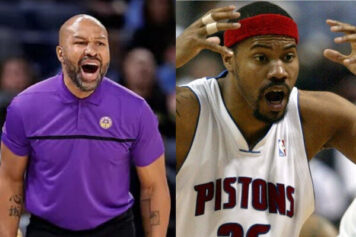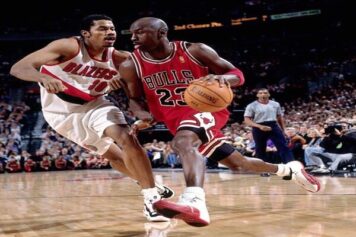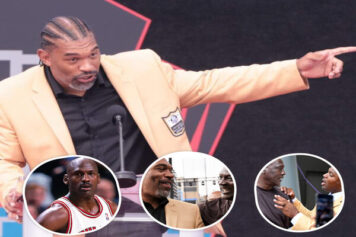Here is Part II of our Q&A with University of North Carolina Tar Heel legend Jerry Stackhouse. If you missed Part I, you can read it here.
Even though UNC won the National Championship the year before with Eric Montross, Donald Williams and George Lynch, it was evident that when you and Rasheed arrived, that you guys were the team’s best two players. How frustrating was it to not start and get limited playing time during your freshman year?
That was one of the toughest things. I wasn’t happy, knowing that I deserved to play more. I felt like I was transferring after every game. I was seeing what Joe Smith was doing with the opportunities and playing time that he was being given at Maryland, and I was playing half the game, even though I was working these guys out in practice.
How did you deal with that frustration?
I used to go to Coach Smith’s office and try to get an explanation as to why I wasn’t playing more. Rasheed and I were beating a group in practice that were National Champions and felt like we should have been on the court more than just a few minutes a game.
What did Coach Smith tell you?
He told me that I should try to focus on me and Brian Reese being the best small forward tandem in the country. But I was 18 years old, and told Dean Smith, “I can be the best small forward in the country all by myself. I don’t need Brian Reese to do that.”
Was there a moment when the frustration crystallized?
After one game, I was really down. I went back to my dorm and saw my mom. I told her, “I’m sick of this. I’m going someplace else.” And she told me, “If you start running now, you’ll run forever.” That hit me hard, because I ain’t no runner. The lightbulb flashed on right then and there and I realized that I just needed to suck it up.
So what happened from there?
From that point on, everything turned. I started working harder, diving for loose balls in practice, competing harder than I ever had. And I started getting more playing time. The next thing you know, I was the MVP of the ACC Tournament that year. A UNC freshman hadn’t done that since Sam Perkins and Phil Ford.
Looking back on it now with some life perspective, how do you view your freshman year?
I didn’t know all of the dynamics that came with being a senior at North Carolina. When you’re in the middle of something, sometimes you don’t see the bigger picture. Coach Smith had a system and a hierarchy that superseded me wanting to show everybody that I was the best player in the country. Now, I understand what that was all about and I’m glad that he did it that way.
Why?
If I was a senior and had given my time to the program like those guys did, had won a National Championship, I feel like I would have deserved the nod over a freshman.
Do you wish you handled the situation differently and been more patient?
One part of me wishes I had just shut up a little bit more and allowed the process of natural selection to take place. I wish I didn’t push as hard as I did. But there’s also a part of me that says that if I didn’t push as hard and try to carve out a place for me during my freshman year, would I just now be walking away from the game some 19 years later? I don’t know the answer to that.
That freshman year ended unceremoniously with a second round loss to Boston College. How tough was that defeat, knowing that you guys had the talent to win it all?
That was very tough to swallow. We played a tough team that seemed to hit every big shot. They had a great backcourt with Howard Eisley and you can go far in the tournament when you have excellent guards. I remember that BC got hot, that Bill Curley was up for the challenge of matching up against Eric Montross. It was a close game that we had a chance to win at the end, but we didn’t get it done.
There were some tough lessons that we learned that year, but it fueled us to come back the next year and make a heck of a run to the Final Four.
I thought you guys were better than Arkansas and UCLA the next year. Why do you think you didn’t win the title?
Rasheed was hurt coming into the Final Four and he wasn’t able to play at the level that he’d played at all season. I took a knee in the thigh during one of the first plays of the game. Our teammate Dante Calabria, who was the country’s best three-point shooter, went 1 for 10 from the field in that game. It just wasn’t in the cards for us. And even if we’d beaten Arkansas to go to the National Championship game, I don’t know if I could have even played because my leg was swollen so bad.
You turned pro after your sophomore year, but you had an innate competitive fire and hunger, on top of your skills, that made you ready for the NBA. A lot of these kids leaving school early today don’t seem to have the skills or the heart that you had.
All these guys that are talking about being ready to come into the league, they better re-think this thing. When you come into the NBA, it’s real. You’re talking about guys’ jobs, their livelihood, and they take it very seriously. I encourage these kids, if you’re ready, by all means come out.
But if you have any doubt in your mind, stay in school and give yourself an opportunity to be prepared for the business. Because the NBA is not the camaraderie or the fun that college basketball is. Guys want your job and they’ll do anything they can to take it.
One of the NCAA Tournament games that I was most excited to ever see was you and Rasheed against Allen Iverson and Georgetown in the Sweet 16 in 1995. What do you remember about that game?
Well, first of all, I was the biggest Georgetown fan in the world when I was growing up. That was where I wanted to play my college ball. But they didn’t recruit me. I guess John Thompson figured that I wasn’t going to leave the state of North Carolina.
But that full court press of theirs and their aggressive philosophy, I loved it. I had the Hoyas Starter jacket and the whole nine! Had John Thompson put the full court press on me during my recruitment, I would have been a Hoya. That’s real talk!
Iverson at Georgetown was unreal. Were you hyped for that match-up?
Allen Iverson and I had played each other in AAU ball, when his Boo Williams team beat my team, so there was a little history there. And they had Othella Harrington, who was considered one of the best players in the country coming out of high school. That was a big game.
What do you remember about the actual game?
I remember the genius of Dean Smith. Georgetown was a big help team on defense that loved to press. Coach Smith turned me into a facilitator that game. When I penetrated, they’d converge on me, so I was throwing bounce passes and lob passes to Rasheed. It is definitely one of the college games that I’ll always remember.
I recall that you had half of your team’s assists in that game. So in practice, Dean Smith put that wrinkle in there, to have you attack the defense as a passer?
Yeah, he did something different for that game and put the ball in my hands. I normally played both forward positions, but with Georgetown’s pressing and trapping, I was waiting to get the ball off of every trap and he told me to attack the basket and to be aggressive. He knew that they would leave their man to stop me, which would open the rim up for Rasheed and our other bigs.
I’m sure he knew that your future as a pro would be as a shooting guard. When he implemented the game plan, what were you thinking?
I was excited for the challenge. When they swung the ball to me, I just attacked and put the pressure on the defense to see what would open up. And what opened up were a lot of easy baskets for Rasheed. And we were able to beat them pretty soundly.
You were ferocious on the court, but many people don’t know that you had a similar determination in the classroom. Why was it so important to you, to come back every summer and work toward completing the academic requirements for your Bachelor’s Degree?
When I decided to leave school early, I promised my mom and Coach Smith that I was going to come back and finish. It took me four years after I left but it was well worth it. Aside from my athletic accomplishments, getting my degree was one of the biggest accomplishments of my life.
I think that the comparisons to Jordan were very unfair. You were a much different player than he was. Did being compared to Mike ever bother you?
I was just focused on trying to be good at what I was doing. I found my niche, so I wasn’t worried about the expectations or comparisons to Michael Jordan. It was flattering, but Dude, I never played the shooting guard position a day in my life before I got to the NBA in 1995.
So I never felt, realistically, that there was any pressure on me. The only thing I was concerned with was carving out my own path. And today, 18 years later, I can live with the results of the work that I put in.
So looking at this year’s tournament, give me some of your thoughts and insights.
I really like Kentucky. I like the way they’ve grown up. There were a lot of people who watched that Wichita State game that wanted Kentucky to lose. I’m pulling for those guys because of the way that they have competed in this tournament. I hope they win it, but it’s going to be tough.
What do you think about UCONN?
Kevin Ollie and I participated in the NBA Players Association coaching clinics together, so seeing him come up and have the type of success that he is having as a young coach, I wouldn’t be mad if he won it all as well.
What makes March Madness so magical?
Because you have to play your best game, and even if you play your best game, there may be factors that you can’t control, like a great shot at the buzzer that sends you home. You have all of these great teams, all of these great players and the teams are so evenly matched. You never really know what’s going to happen. That’s what makes it magical to me.



